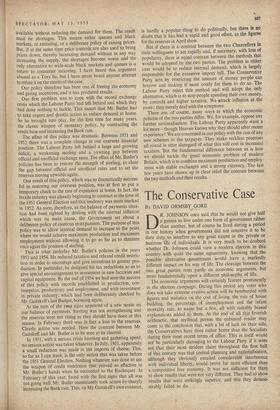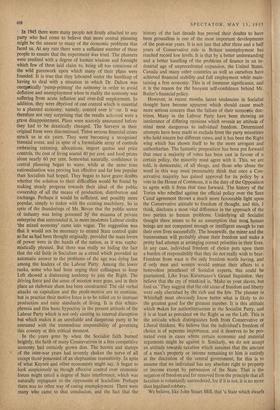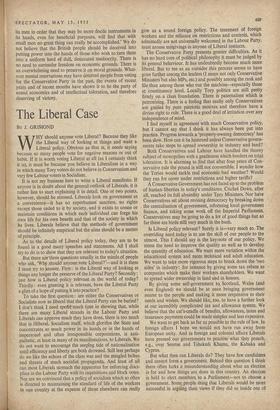he Conservative Case
BY 15AV11) ORMSBY GORE , DR. JOHNSON once said that he would not give half a guinea to live under one form of government rither than another, but of course he lived during a period in our history when governments did not conceive it to be their duty to interfere to any great extent in the private or business life of individuals. It is very much to be doubted whether Dr. Johnson could view a modern election in this country with quite the same equanimity, knowing that the possible alternative government would have a. markedly different impact on his way of life. The cleavage between the two great parties rests partly on economic arguments, but more fundamentally upon a different philosophy of life.
The economic arguthents will certainly feature prominently in the election campaign. During this period any voter who does not take extreme evasive action will be bombarded with figures and statistics on the cost of living, the rate of house building, the percentage of unemployment and the infant mortality rate, to name but a few, all with suitably biased explanations added to them. At the end of all this feverish arithmetic, that mythical person the unbiased reader may come to the conclusion that, with a bit of luck on their side, the Conservatives have done rather better than the Socialists during their most recent terms of office. This in, itself would not be particularly damaging to the Labour Party if it were not that their most strident claim throughout the first half of this century was that central planning and nationalisation, although they obviously entailed considerable interference with individual liberty, would prove far more efficient than a competitive free economy. It was not sufficient for them to show results that were not very different. They had to show results that were strikingly superior, and this they demon- strably failed to do. In 1945 there were many people not firmly attached to any party who had come to believe that more central planning might be the answer to many of the economic problems that faced us. At any rate there were a sufficient number of these people to ensure that the experiment was tried. The planners were credited with a degree of human wisdom and foresight which few of them laid claim to, being all too conscious of the wild guesswork upon which many of their plans were , founded. It is true that they laboured under the handicap of having to deal with a situation in which DX. Dalton was energetically 'pump-priming' the economy in order to avoid deflation and unemployment when in reality the economy was suffering from acute inflation and over-full employment. In addition, they were deprived of one control which is essential to a planned economy, namely, control over la' )ur. It was therefore not very surprising that the results achieved were a grave disappointment. Plans were scarcely announced before they had to be drastically changed. The Surveys in their original form were discontinued. Three serious financial crises struck us in six years. They were becoming a recognised biennial event, and in spite of a formidable array of controls embracing rationing, allocations, import quotas and price controls, the cost of living soared 40 per cent. and food prices alone nearly 60 per cent. Somewhat naturally, confidence in central planning began to wane, while at the same time nationalisation was proving less effective and far less popular than Socialists had hoped. They began to have grave doubts whether the solution to their difficulties would be found by making steady progress towards their ideal of the public ownership of all the means of production, distribution and exchange. Perhaps it would be sufficient, and possibly more popular, simply to tinker with the existing machinery. So in spite of the thunderings of Mr. Bevan that the public sector of industry was being poisoned by the miasma of private enterprise that surrounded it, in more moderate Labour circles `the mixed economy' came into vogue. The suggestion was that it would not be necessary to extend State control quite so far as had been thought originally, provided the main levers of power were in the hands of the nation, as it was euphe- mistically phrased. But there was really no hiding the fact that the old faith in Socialism as a.creed which provided an automatic answer to the problems of the age was dying fast among the leaders of the Labour Party. Among the lower ranks, some who had been urging their colleagues to keep Left showed a distressing tendency to join the Right. The driving force and the sense of mission were gone. and in their place an elaborate sham has been constructed. The old verbal attacks on capitalism and the profit-motive are to continue, but in practice their motive force is to be relied on to increase production and raise standards of living. It is this schizo- phrenia and this basic hypocrisy in the present attitude of the Labour Party which is not only causing its internal disruption but which makes it an unreliable and dangeroui party to be entrusted with the tremendous responsibility of governing this country at this critical moment. history of the last decade has proved their doubts to have been groundless is one of the most important developments of the post-war years. It is not just that after three and a half years of Conservative rule in Britain unemployment has reached record low levels. It is that by a better understanding and a better handling of the problems of finance in an in- dustrial age of unprecedented expansion, the United States, Canada and many other countries as well as ourselves have achieved financial stability and full employment while main- taining a free economy. This is of immense significance, and it is the reason for the buoyant self-confidence behind Mr. Butler's financial policy.
However, in recent months latent tendencies in Socialist thought have become apparent which should cause much more serious concern than the failure of their economic doc- trines. Many in the Labour Party have been showing an intolerance of differing opinions which reveals an attitude of mind most dangerous to individual freedom. Determined attempts have been made to exclude from the party minorities who hold sincere but different views, and it has been the Right wing which has shown itself to be the more arrogant and authoritarian. The fantastic proposition has been put forward that once a majority of votes has been cast in favour of a certain policy, the minority must agree with it. This, we are told. is democratic, of all things, and those who abuse the word in this way must presumably think that once a Con- servative majority has gained approval for its policy by a vote in the House of Commons, it is the duty of the Opposition to agree with it from that time forward. The history of the Tories who rebelled against the official policy over the Suez Canal agreement throws a much more favourable light upon the Conservative attitude to freedom of thought, and this, I think, discloses a most vital difference in the approach of the two parties to human problems. Underlying all Socialist thought there seems to be an assumption that most, human beings are not competent enough or intelligent enough to run their own lives successfully. The housewife, the miner and the businessman will probably abuse their freedom and make a pretty bad attempt at arranging correct priorities in their lives. In any case, individual freedom of choice puts upon them a burden of responsibility that they do not really wish to bear. Freedom from want is the only freedom worth having, and if only men and women would entrust their affairs to a benevolent priesthood of Socialist experts, this could be guaranteed. Like Ivan Karamazov's Grand Inquisitor, they believe that the cry of mankind is, 'Make us your slaves, but feed us.' They suggest that the old ideas of freedom and liberty were only cherished by the rich and the few. The planner in Whitehall must obviously know better what is likely to do the greatest good for the greatest number. It is this attitude which makes for authoritarianism in the Socialist Party, and it is at least as prevalent on the Right as on the Left. This is the attitude which distinguishes both from Conservative or Liberal thinkers. We believe that the individual's freedom of choice is of supreme importance, and it deserves to be pro- tected' even in cases where certain economic and material arguments might be against it. Similarly, we do not accept an attitude towards taxation which assumes that the amount of a man's property or income remaining to him is entirely at the discretion of the central government, for this is to its men in order that they may be more docile instruments in its hands, even for beneficial purposes, will find that with small men no great thing can really be accomplished.' We do not believe that the British people should be deceived into putting power into the hands of those who wish to turn them into a uniform herd of dull, desiccated mediocrity. There is no need to surrender freedom on economic grounds. There is an overwhelming need to preserve it on moral grounds. What- ever mental reservations may have deterred people from voting for the Conservative Party in the past, the events of recent years and of recent months have shown it to be the party of sound economics and of intellectual toleration, and therefore deserving of victory.




































 Previous page
Previous page